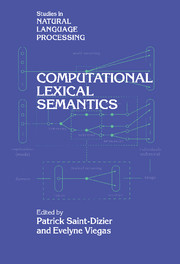Book contents
- Frontmatter
- Contents
- List of contributors
- Preface
- 1 An introduction to lexical semantics from a linguistic and a psycholinguistic perspective
- Part I Psycholinguistics for lexical semantics
- Part II Foundational issues in lexical semantics
- Part III Lexical databases
- Part IV Lexical semantics and artificial intelligence
- Part V Applications
- Part VI Computer models for lexical semantics
- Author index
- Subject index
Part IV - Lexical semantics and artificial intelligence
Published online by Cambridge University Press: 29 September 2009
- Frontmatter
- Contents
- List of contributors
- Preface
- 1 An introduction to lexical semantics from a linguistic and a psycholinguistic perspective
- Part I Psycholinguistics for lexical semantics
- Part II Foundational issues in lexical semantics
- Part III Lexical databases
- Part IV Lexical semantics and artificial intelligence
- Part V Applications
- Part VI Computer models for lexical semantics
- Author index
- Subject index
Summary
Lexical semantics knowledge often requires various kinds of inferences to be made in order to make more precise and more explicit the meaning of a word with respect to the context in which it is uttered. The treatment of inheritance is particularly crucial from this point of view since linguistic as well as conceptual hierarchies allow us to relate a word with more generic terms that contribute, in a certain sense, to the definition of the meaning of that word. Because hierarchies are complex, inheritance often involves non-monotonic forms of reasoning. Another relation with artificial intelligence is the development of models and techniques for the automatic acquisition of linguistic knowledge.
In “Blocking”, Ted Briscoe et al. elaborate on the introduction of default inheritance mechanisms into theories of lexical organization. Blocking is a kind of inference rule that realizes a choice when two kinds of inheritances can be drawn from resources occurring at different levels in the lexical organization. For example, a general morphological rule adds -ed at the end of verbs for the past construction. A subclass of verbs consists of irregular verbs, which receive a particular mark for the past. A default rule states that the exceptional mark is preferred to the general case. However there exist verbs such as dream, which accept both flections (dreamt, dreamed). Then the default rule is no longer adequate and a more flexible solution is required. In this chapter, a framework based on a non-monotonic logic that incorporates more powerful mechanisms for resolving conflicts of various kinds is introduced.
- Type
- Chapter
- Information
- Computational Lexical Semantics , pp. 271 - 272Publisher: Cambridge University PressPrint publication year: 1995



